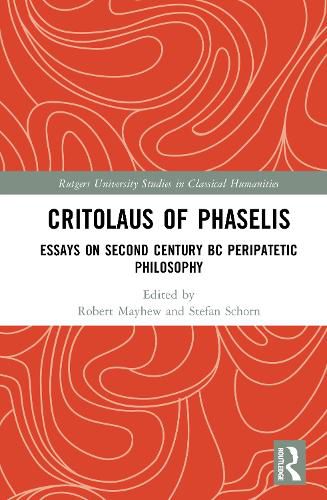Readings Newsletter
Become a Readings Member to make your shopping experience even easier.
Sign in or sign up for free!
You’re not far away from qualifying for FREE standard shipping within Australia
You’ve qualified for FREE standard shipping within Australia
The cart is loading…






This is the first volume in over a century devoted to the second century BCE Peripatetic philosopher Critolaus of Phaselis, covering his views on cosmology, god, ethics, rhetoric and politics.
Critolaus of Phaselis was the most prominent Aristotelian philosopher of the second century BCE; he was at the center of debates in ethics and rhetoric, and there is evidence that he also developed views on the nature of the soul, god and the cosmos, as well as on politics and history. Nothing that he wrote survives in full, but aspects of his doctrine are known from references in later literature. This volume explores every aspect of his work, reconstructing Critolaus' philosophical convictions and analysing his position in the context of Hellenistic philosophy, especially in relation to Stoic philosophy.
Critolaus of Phaselis offers a fascinating insight into an understudied figure. The book is suitable for students and scholars of Aristotelian and Peripatetic philosophy, as well as Hellenistic philosophy more broadly.
$9.00 standard shipping within Australia
FREE standard shipping within Australia for orders over $100.00
Express & International shipping calculated at checkout
This is the first volume in over a century devoted to the second century BCE Peripatetic philosopher Critolaus of Phaselis, covering his views on cosmology, god, ethics, rhetoric and politics.
Critolaus of Phaselis was the most prominent Aristotelian philosopher of the second century BCE; he was at the center of debates in ethics and rhetoric, and there is evidence that he also developed views on the nature of the soul, god and the cosmos, as well as on politics and history. Nothing that he wrote survives in full, but aspects of his doctrine are known from references in later literature. This volume explores every aspect of his work, reconstructing Critolaus' philosophical convictions and analysing his position in the context of Hellenistic philosophy, especially in relation to Stoic philosophy.
Critolaus of Phaselis offers a fascinating insight into an understudied figure. The book is suitable for students and scholars of Aristotelian and Peripatetic philosophy, as well as Hellenistic philosophy more broadly.